The Greatest Villains of Every Myers-Briggs Type – Part 4 – The Guardians
Today we get to take a look at our final group of Myers-Briggs villains: The Guardians. Guardians make up 40-45% of our population. These individuals are known for being practical, responsible, and for upholding time-honored traditions. They are often the historians, the teachers who helped you do your best at school or even US Presidents like Harry S. Truman or George Washington. Some of the same qualities and personality traits that make SJ types incredible can also be used in the wrong way and make them quite daunting villains. They have a desire for order and a longing for tradition, so if they espouse themselves to a corrupt system or a demented ruler they are often the villains that promote this system at all costs – no matter how twisted that system is. Let’s take a look…
Not sure what your personality type is? Take our new personality questionnaire here. Or you can take the official MBTI® here.
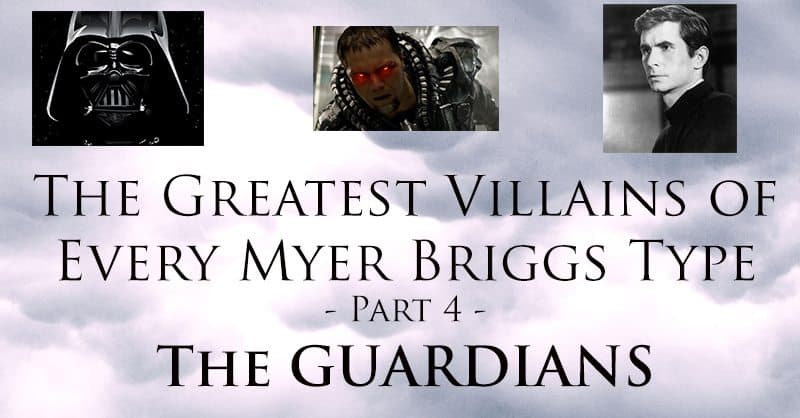
Want to find the NT villains? Click Here
SP villains? Click Here
NF villains? Click Here
ISTJ – Darth Vader
Almost every Myers-Briggs type wants to have Darth Vader as their own villain, but alas, the ISTJs are the ones who get to claim him. He’s an excellent example of an unhealthy ISTJ. For this assessment, I’m only going to look at the Darth Vader of the classic Star Wars movies – I haven’t seen the new movie and I don’t even know if he’s in it.
On a side note: In real life people don’t change personalities, but in movies this can happen because these are fictional characters after all and screenwriters don’t always write the most three-dimensional characters, especially for villains. So Anakin Skywalker from the prequels may have a different personality than Darth Vader of the classic movies.
We see Vader’s use of Si (Introverted Sensing) and Te (Extraverted Thinking) in the way he desires order and structure in the universe. He has no problem dishing out commands or taking the lead, but he thinks before he speaks and keeps certain thoughts and feelings private. Where ESTJs or ENTJs tend to think ‘out loud’ more, ISTJs will keep their thoughts more hidden and only say what they feel is necessary. This is apparent with Vader who chooses his words carefully and has a purpose for each thing he says. Vader doesn’t mind working underneath the Emperor – he doesn’t desire total control, which is something an EJ type would be more likely to want. Darth Vader is proficient at making sure his master, Emperor Palpatine’s, requests are met and that things are finished in a timely manner. Order, routine, and the schedule at hand are all very important to Vader.
“ Join me, and I will complete your training. With our combined strength, we can end this destructive conflict and bring order to the galaxy.”
“You may dispense with the pleasantries, Commander. I’m here to put you back on schedule.”
We see Vader’s use of Fi (Introverted Feeling) in the way he cares deeply for his son, Luke, no matter how much he may try to restrain his feelings. His emotions and compassion aren’t broad – he has no concern for the soldiers he kills, but he can’t let go of his feelings for his children. In the end, Vader’s Fi redeems him and shows that he’s more than just the Emperor’s puppet.
Darth Vader’s use of inferior Ne (Extraverted Intuition) is limited – we mostly see him using Te, his more advanced function. However, we do see Vader use Ne in the possibilities he sees if only Luke and himself are able to form a partnership.
There are various opinions on Darth Vader’s personality type – some different from mine. I am completely okay with this because as I write these posts I find it harder and harder to truly type a fictional villain’s personality. So if you want to see various perspectives, you can check out these links:
Darth Vader – ISTJ – Zombies Ruin Everything
Darth Vader – ISTJ – Funky MBTI Fiction
Darth Vader – ENTJ – Marissa Baker (I love this blogger and she does a good job of providing an alternative theory about Darth Vader’s type!)
ISFJ – Norman Bates from Psycho
Norman Bates at first glance comes across as gentle, unassuming and soft-spoken. He’s driven to fulfill his duty as a good son and continue running Bates Motel. He’s so bound by his responsibility and obligation, that in the end it drives him mad. ISFJs are some of the most responsible, kind-hearted people you will ever meet. Yet they can get caught up in taking care of so many responsibilities that they become overwhelmed. We see Norman’s Si (Introverted Sensing) in the way he can’t let go of the past – not of what his mother did to him or how he murdered her – he has to keep living in the past and isn’t able to pull himself away from it. He’s bound by his responsibility to his mother, and his goals involve her happiness. Unhealthy Si/Fe users can get extremely caught up in their perceived responsibilities and duties, and Norman Bates is so caught up in them that he can see no other life but one in which he’s continually trying to make up for his past mistakes by showing his loyalty and responsibility to his mother.
We see Norman’s use of Fe (Extraverted Feeling) in the way he relates to the people he speaks with. He has a very universally understanding tone and addresses things in a broad way that relates to the person he’s speaking with and isn’t just focused on his own personal emotions.
“She just goes a little mad sometimes. We all go a little mad sometimes. Haven’t you?”
“You know what I think? I think that we’re all in our private traps, clamped in them, and none of us can ever get out. We scratch and we claw, but only at the air, only at each other, and for all of it, we never budge an inch.”
Fe users are excellent at understanding and feeling the emotions of others, but they are more out of touch with themselves and their own feelings – they can lose themselves in absorbing and addressing other people’s feelings. Norman exemplifies this in the way he cares so much for his mother that he loses his own personality in the process.
“If you love somebody, you wouldn’t leave them even if they treat you badly. Do you understand? I don’t hate my mother. I hate at what she’s become. I hate her illness.”
We see Norman’s use of Ti (Introverted Thinking) in the way he comes up with logical solutions to solve his problems. When he deals with the police who come looking for Marion Crane, he quickly has answers to cover for himself – but, for the most part, he’s quiet and difficult to read. His inferior Ne (Extraverted Intuition) is extremely stifled; he’s unable to see any other possibilities in life besides remaining at the hotel, doing his “mother’s” bidding, and continuing in a hopeless pattern day after day. A healthy ISFJ would have some good use of their Ne, but Norman Bates struggles with the ideas of alternatives and possibilities, as an unhealthy ISFJ would.
Clearly Norman Bates has a mental disorder: dissociative personality disorder. I am not saying that ISFJs are more likely to have this disorder or that ISFJs that are unhealthy are going to all be as unstable as Norman Bates. Norman Bates is an example of an extremely unhealthy and imbalanced ISFJ, and he is not characteristic of ISFJs in general. All of these villains show us what unhealthy forms of certain personality types might look like – and in this case, there’s a mental disorder on top of that to further confuse things.
ESTJ – General Zod from Superman
General Zod lives for order, structure, and logic. He sees the world in black and white – he needs to save his people and the planet of Krypton, and these lower life-forms (humans) are in the way. He states things directly, plainly, and gets his point across – this is the way ESTJs like to take care of matters. They’re here to get the job done, and they don’t have time to walk on eggshells or make sure everyone feels alright about what they have to say. ESTJs want to order the outer world, want to have structure, they want everything to make sense quickly. They’re very loyal to their people, their traditions (not ALL traditions, but the ones they’ve chosen), and their beliefs. They will do whatever they can to fulfill what they believe is their duty to these beliefs and to their people. This can make them incredible leaders, passionate protectors, but also formidable villains.
“I have a duty to my people. And I will not allow anyone to prevent me from carrying it out.”
“I exist only to protect Krypton. That is the sole purpose for which I was born. And every action I take, no matter how violent or how cruel, is for the greater good of my people.”
We see General Zod’s Si and Te in the way he holds to the past and consistently brings it up in his dialogue. He has no problem commanding and directing people. He wants everyone to understand his point of view and get on board with his direction and doesn’t understand why anyone would want to waste time debating or questioning him. We see his inferior and unhealthy Fi (Introverted Feeling) in the way he cares for his people – he doesn’t care for the broad scope of humanity and all life forms, but for his people alone. It’s their feelings he cares about, not the feelings of the masses. He doesn’t want to worry about anyone’s emotions when he’s making a statement or trying to convince someone of his ideas – yet he cares deeply for the feelings and well-being of a select group of people.
ESFJ – Draco Malfoy from Harry Potter
This one will probably surprise a lot of people – after all, aren’t ESFJs some of the sweetest people in the world? Well yes, they can be! Any type can be. But an unhealthy ESFJ that is part of a twisted, deranged group of people holding to evil traditions will be a dangerous foe. Draco Malfoy shows his dominant Fe (Extraverted Feeling) in the way he has to surround himself with, and have the approval of, a group of people. He manipulates the feelings of his enemies, and he’s very good at it, because he can sense what will stir their emotions. He’s driven by a desire to please his parents, his friends, and to win the approval of his classmates. His bullying of Harry through emotional manipulation is all part of that desire for approval. He also takes to gossiping with his friends and enjoys re-hashing his triumphs; something that unhealthy or imbalanced ESFJs are prone to do.
He shows his Si (Introverted Sensing) in the way he clings to the traditions of his family and the death eaters. He still believes that Hogwarts should consist only of pureblood wizards; an idea passed down to him by his family and his surroundings. In his own way, he believes what he’s doing is good and right because that’s what he was taught by his parents. He’s developed a twisted sense of morality by his upbringing and holds to those values in the way he lives his life.
“Father always said that Dumbledore was the worst thing that ever happened to this place.”
“Father says it’s a crime if I’m not picked to play for my House, and I must say, I agree.”
In the end of the Harry Potter films, we see Malfoy struggling with his morals and values – the same values he’s been raised with. It is easy to see that he picks his values based on the traditions he’s grown up with, and less on his own personal reflections and insights. We can see how Draco Malfoy could have been a wonderful wizard had he been brought up in a family of kind and good people who instilled in him a different set of values.
Some sites list Draco Malfoy as an ESTP, but that just doesn’t make sense to me. If he was Se-dominant, he’d be living more obviously for the thrills and excitement of the moment and less for the approval of his group of people. He’s frightened when tasked to go into the dark forest at night, he reacts with fear and emotion frequently, and in the end of the films we see him consistently questioning his values. An ESTP villain would be motivated by a desire to live on impulse, to test his boundaries, to live audaciously and without fear, to experience thrills. While this is something Draco may desire to be like, his natural tendency seems to be to carry on the traditions of his family, to win the approval of his peers, and to carry out his duty as Lucius Malfoy’s son.
Find out more about your personality type in our eBook, Discovering You: Unlocking the Power of Personality Type.
In Conclusion…
I hope this has been enjoyable to read! I feel that I’ve probably offended all 16 personality types in these blogs now and I’m ready to move on to another subject that’s a little less polarizing 🙂 I think SJs, NT, NFs & SPs are all equally incredible and have the same capacity for goodness and evil. So I hope if you’re just reading one of these posts you’ll look at the other posts on villains to know that I’m not just picking on your type alone. If you have any comments or questions let me know!


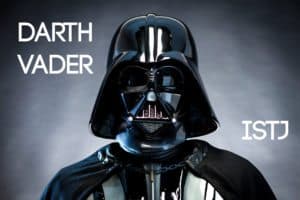

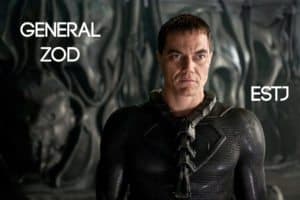
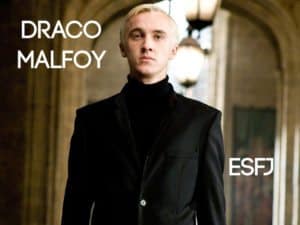



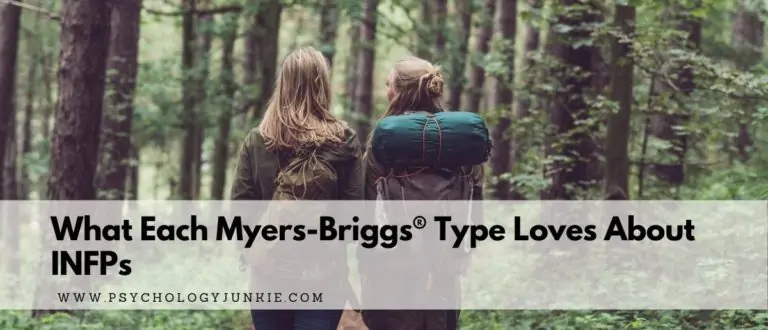
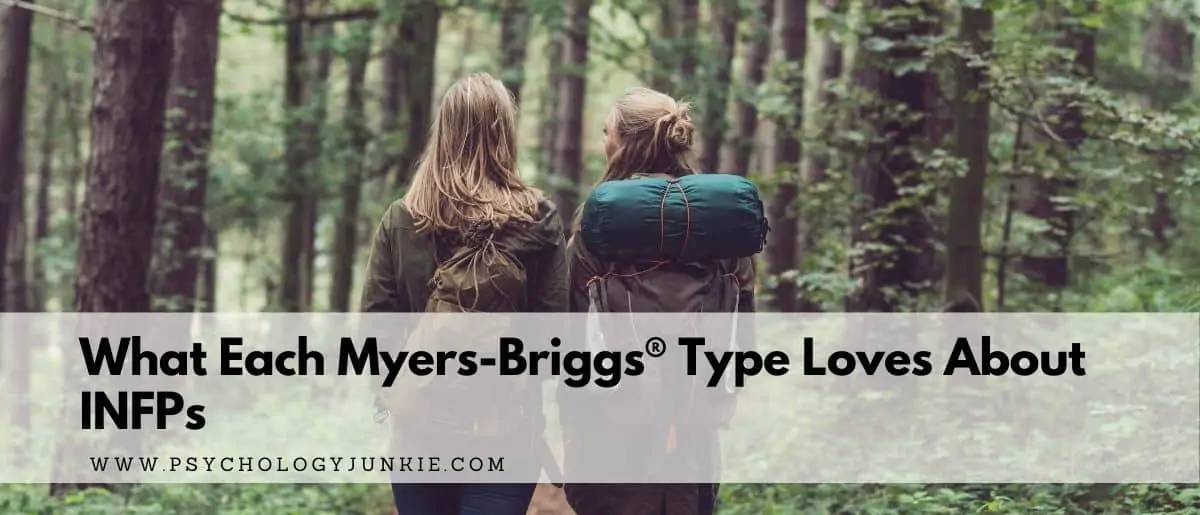
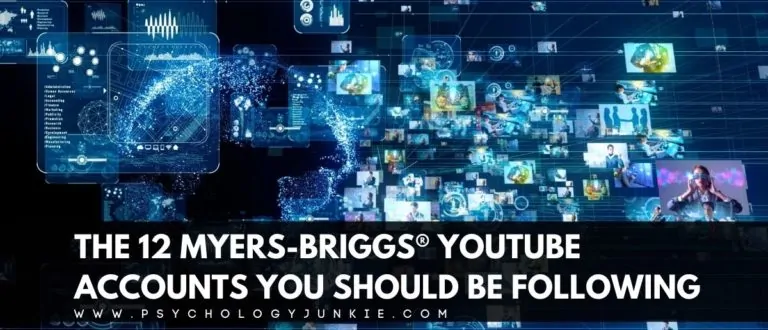
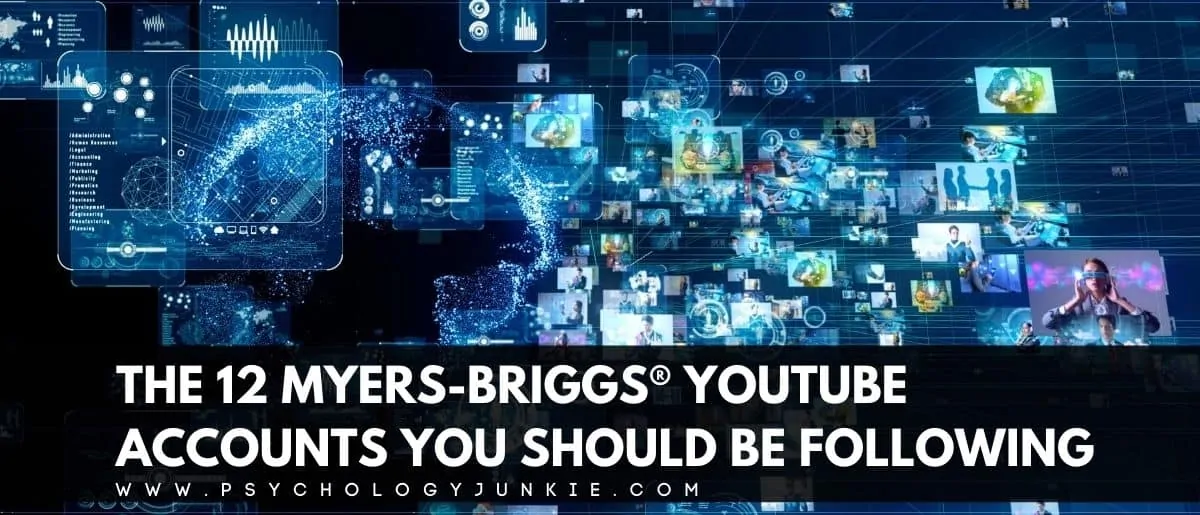


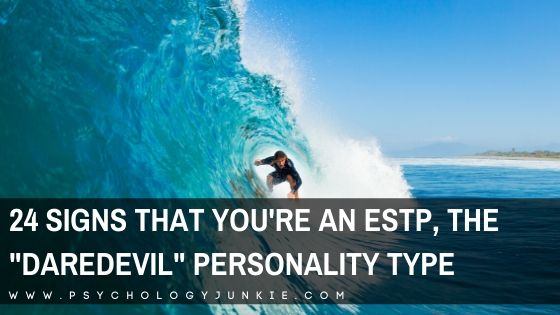

I really enjoyed the explanation for Draco as an ESFJ. I’ve had trouble typing him in the past but I think you’ve hit the nail on the head with that one!
Thanks for these “villain” posts, Susan. I’m working on a YA novel and this has helped me to see some of the unhealthy characteristics of the various types and why they would turn to evil.
That’s wonderful! I hope I can read it when it’s done! I’ve really enjoyed your fairy tales 🙂
Awww, thanks so much, Susan. I would love you to someday read my novel. Your site is my go to place whenever I have a quandary about how to develop a character in an authentic way. It helps so much to know their type. I am kind of behind on the fairy tales. I had an art thing to develop and I am also determined to finish revisions on my YA novel this summer. I love to share your site with my writer friends. So, thanks again!
Awww, thanks so much, Susan. I would love you to someday read my novel. Your site is my go-to place whenever I have a quandary about how to develop a character in an authentic way. It helps so much to know their type. I am kind of behind on the Myers Briggs fairy tales. I had an art thing to develop and I am also determined to finish revisions on my YA novel this summer. I love to share your site with my writer friends. So, thanks again!
I’m really loving this site. I’m currently developing a novel and I think your breakdowns make far more sense than so many out there. If you ever get the chance you should post a list of all the characters you have talked about broken down into: Heroes & Villains & Those in between!
Thank you for your work!
A
Thank you so much Arthur! You will have to let me know when your novel is finished! I think your idea is great also 🙂 Really glad you’re enjoying my site!
I’ve actually seen an argument for ESFP for Vader, mostly operating from the lower Te/Ni, and Fi being ignored until he reunites with Luke. Anakin Skywalker is typed as an ESFP, and Vader is still technically Anakin, even if he does away with his past self. So he in effect becomes ENTJ-ish as Vader
I came here from Pinterest partly because I love writing and was looking for a way to pin down the characters and partly because I’m currently obssessed with MBTI. Halfway through Part 1, I was hooked and eagerly read through the whole thing. So, just, thanks for writing this, it was a joy to read.
“I feel that I’ve probably offended all 16 personality types in these blogs now.” Actually, the moment I was hooked on this series was when my type came up. INTJ. I’ve never seen Star Trek nor know who Khan is, but your description of him have me nodding. Yep, that’s INTJ, and now I just want to watch Star Trek because Khan seems like a pretty awesome guy, villain or no.
I really enjoyed this 4 part series on MBTI and villains. Thank you for these excellent examples!
I have truly enjoyed reading and thinking about this series about villans and topology. I am also a certified instructio in MBTI© and feel your assessments are right on the money.
This series nicely points out how the various types, usually seen as positive, can be adversely impacted by the conditions they grow up in or some part catastrophic trauma that has somehow rewritten their perceptual framework thought which their personality type views the world.
Very well done!